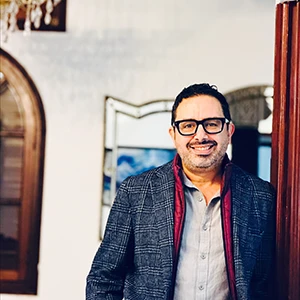
Letter from the Chair
The Department of French & Italian at Tulane continues to evolve in response to one of the most pressing educational questions of our time: what does it mean to learn a language in the 21st century? In an era marked by instant translation technologies and increasing digital dependency, we are rethinking language learning as not merely a linguistic skill, but a discipline of attention, cultural immersion, and intellectual presence.
This year, our faculty have been engaged in a deep collaborative effort to redesign aspects of the curriculum and student experience to make language learning more mindful, interdisciplinary, and globally relevant. Guided by research in cognitive science, pedagogy, and multilingual literacy, we are reshaping our practices to cultivate durable skills of focus, comprehension, memory, and cultural nuance.
To that end, we are preparing to move toward a model of deep learning over fast consumption. One dimension of this shift involves a gradual transition away from laptop-based notetaking and toward handwriting, repetition, and close textual annotation, practices that neuroscience increasingly associates with sustained comprehension and memory. We are also developing guidelines that would foster greater immersion in French and Italian in the classroom, encouraging students to engage more intuitively and confidently with the language rather than defaulting to translation or passive reception. These initiatives aim not at rigidity, but at reclaiming a language classroom as a space of sustained attention, presence, and intellectual curiosity.
We are also in the process of refining our program identities to better reflect the wide geographical and cultural range of the languages we teach. We anticipate adopting the names Global French Studies and Italian Studies, which will enable us to foreground the transnational and interdisciplinary breadth of our curriculum, encompassing Europe, Africa, the Caribbean, North America, and beyond. We are likewise exploring connections with Louisiana French and Louisiana Creole, Indigenous and émigré Francophone traditions, and new vectors of linguistic contact in contemporary culture.
Looking forward, our goal is not simply to teach languages, but to cultivate a durable form of intellectual engagement, the kind that prepares undergraduates for meaningful careers, graduate education, TAPIF opportunities, international mobility, and rich cultural citizenship. Language learning, at its best, is an antidote to superficiality: it teaches patience, humility, attentiveness, improvisation, and the capacity to think in worlds other than one’s own. And in a world increasingly influenced by artificial intelligence and automated cognition, these human intellectual qualities — depth, adaptability, critical nuance, and interpretive imagination — will make our students stand out in their professional lives as thinkers rather than mere processors of information.
Much of this exciting work lies ahead, and we will pursue it with the energy and dedication of our faculty and graduate students, the enthusiasm of our undergraduates, and the sustaining interest of our alumni and friends. Your engagement – intellectual, cultural, and philanthropic – helps make our mission possible.
Thank you for being part of this journey. We look forward to sharing more developments as the department continues to grow.
Sincerely,
Fayçal Falaky
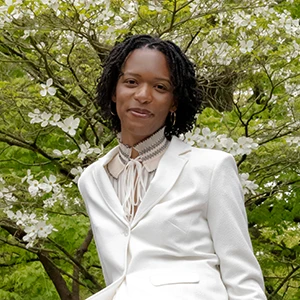
Graduate Student Spotlight
Sylvette Dupe-Vete-Congolo describes her decision to pursue graduate studies as “essential to both my personal and professional growth.’ Now in her first year of the Tulane French & Italian PhD program, she shares how her lived experiences have shaped the intellectual passions that led her to continue her academic journey at Tulane.
Sylvette received her BA in Africana Studies from Wellesley College in May of 2025 before joining Tulane's Department of French and Italian in August. She chose to continue her studies in the historically francophone and culturally diverse city of New Orleans, as it offers an environment that strongly aligns with her academic focus on the Afro-Francophone Atlantic world, and its ties with Africa, Europe, and Asia. Given the rich Black culture and linguistic diversity found in New Orleans, the city’s archival resources, museums, and accessible community provide the perfect foundation for the fieldwork she hopes to pursue. The department's certificate programs in Women's and Gender Studies and Africana Studies, along with its curriculum on Francophone regions such as the Caribbean, Francophone Africa, and Europe, made it a natural home for her interests.
As a multicultural and multilingual Black woman born and raised in the US, Sylvette describes herself as deeply rooted in her Caribbean culture. She draws from this foundation and her lived experience to shape her intellectual pursuits by navigating diverse parts of the world through travel, extensive literary exploration, and sustained philosophical inquiry. She is particularly driven by a desire to understand and highlight the contributions of women to the evolution of global ideas; specifically, Francophone Caribbean women and the relationship between the Caribbean and the African American communities.
Since beginning her studies at Tulane, she attributes a sharpened research focus and expanded theoretical foundation to Professor Jean Godfrey Bidima’s “Francophone Art, Literature, and Politics” course. Professor Bidima introduced her to essential works and critical frameworks that are central to her interests, and she described the course as “not only intellectually stimulating but also deeply relevant to contemporary life.”
What’s next for Sylvette? While she recognizes that academia is rapidly evolving: politically, structurally, and intellectually, she remains focused on continuing to grow and complete her degrees, as “there is still much to learn and accomplish.” Sylvette’s path will be determined by this ever-changing landscape, but her desire to learn and commitment to exploring the intersection of race, gender, and Francophone cultures promise to make meaningful contributions to the field.
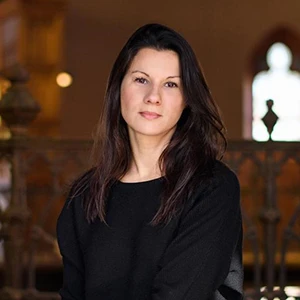
Graduate Alumnus Spotlight
Dr. Carole M. Trevise’s path to her current position as a professor at Princeton University didn’t follow a traditional academic trajectory but began in the high school classrooms of New Orleans. Already certified to teach in both France and the United States, Carole brought years of teaching experience when she made the decision to pursue doctoral studies at Tulane University. Her choice, driven by the program’s unique focus on Francophone studies in Louisiana, was influenced by her time spent as a teacher in New Orleans. After receiving her PhD, she was hired by Tulane as visiting professor before being hired at Princeton just a year later.
“I always wanted to teach; I never wanted to do anything else,” Trevise reflects. “I was born for it.” This passion for education shaped her career before beginning her PhD studies, with experience in both France and the US, and was formative for her graduate experience at Tulane. She worked closely with Professor Mignot to adapt teaching programs and methodologies, while her research mentors profoundly shaped her scholarly direction. Professor Falaky guided her research approach and resources, while her PhD advisor, Professor Bidima, offered mentorship that went far beyond typical advising. “I spent hours in his office just taking notes and listening to him,” she recalls. “Bidima and Falaky really shaped my research.”
This mentorship allowed Trevise’s scholarship to evolve and expand. While studying 19th-century French literature at the Sorbonne, her research at Tulane explored anthropology and religious sacrifice. At Princeton where she has taught since 2018 after a year as a visiting professor at Tulane, her work has expanded to examine women’s positions within political ecosystems and post-colonial studies, where her studies at the Sorbonne and Tulane combine.
Trevise discovered that Princeton students were “craving a new kind of content”, meaning perspectives that extended French studies beyond France’s borders. She responded by creating innovative courses, including one exploring the Francophone world’s language and power dynamics, and a freshman seminar on bypassing colonial practices through art and language, co-taught with a colleague from the Spanish department. Her discussions with Falaky and Bidima at Tulane and the resources and methodologies that she gained from these discussions were instrumental in developing these courses.
Now supervising numerous PhD students at Princeton, Trevise carries forward the mentorship model she experienced at Tulane. “You have to be fair, have high standards, be kind, be available, and be funny…that helps,” she explains. Her next venture brings her journey full circle: developing a course with a Louisiana trip component, bringing students to witness the Francophone presence and the unique relationship between Francophone Louisiana and France, studying the evolution of French language as something of shame to something to be proud of.
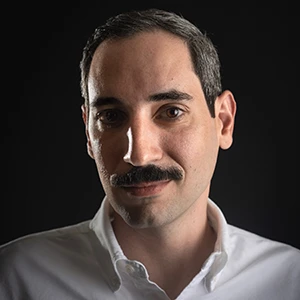
Undergraduate Alumnus Spotlight
Zach Press, who graduated from Tulane in 2010, never imagined that a joke about French pastries would help shape his career path. Now a Senior Counsel at the Guardian, he reflects on how his undergraduate French studies opened unexpected doors and continue to influence his work in media law.
Zach’s first job after graduating was in the Teaching Assistant Program in France (TAPIF), an experience he describes as formative. "A lot of my job as a lawyer involves explaining complicated concepts in a simple way," he notes. "My experience working with dozens of elementary school students probably helped hone those skills." Today, as a media lawyer, he reads the news for a living, helping journalists do impactful work while ensuring minimal legal risk. "I think this is the most fun you can have as a lawyer," he says.
His path to French studies began unexpectedly. Zach didn't plan on majoring in French until after spending his junior year abroad in Paris, where he had the opportunity to study French philosophy. Up until that point, he had just been studying Philosophy but explains that the double major became "a great way to exploit my interest in both fields." Studying abroad in Paris broadened his interest in legal studies to the international level, inspiring him to study French and ultimately motivating him to pursue a second law degree in France years later.
While French influenced his early career as a teaching assistant, it proved valuable in unexpected ways. Describing the spontaneous value of his French major, Zach recounted a story about his first year of law school in New York. While browsing the dessert table at a party, he made a joke about a French pastry to a couple nearby, that he now believed to be “unworthy of repeating.” He credits his career to this chance encounter, as the couple turned out to be the former dean of the law school and his wife, a French art history professor. Their collective love for France led to a conversation where the dean encouraged Zach to apply for a fellowship doing freedom of expression research at Oxford University's faculty of law. That summer while researching in London, Zach first met the Guardian’s legal director. "It's hard to imagine how I would have had the same career without that experience," Zach reflects.
Looking back at his time at Tulane, Zach emphasized the impact of his professors, specifically Professor Falaky and Professor Bidima, describing the latter as "one of the most brilliant people I've ever met, and, more importantly, he's terribly funny." He described his senior seminar course with Professor Falaky as the highlight of his French Studies, encouraging future students to take as many courses as possible with these memorable professors.
While his career in media law is not dependent on French in the average workday, he nods to his coincidental encounter with the former dean and his wife; “Francophiles will always want to talk to you about your French. Impress the right people. Describing the value of French in any career path, Zach advises current French majors to “weave in your knowledge of French and francophone cultures with whatever career path you take,” noting the global reach and cultural diversity of the francophone world.
He notes that while you could say that about learning any language, “French has such a global reach and brings so many different kinds of people together.”
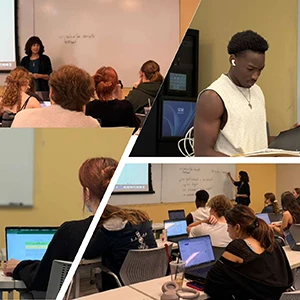
Professional French Program
Launched in the fall of 2018, our Professional French Program has already empowered more than 40 students to graduate with a competitive advantage: earning two degrees simultaneously. Participants complete their Bachelor of Arts or Master’s degree while also obtaining the Professional French Diploma (DFP – Diplôme de Français Professionnel). This sought-after credential enhances their academic profile and opens doors to global career opportunities.
The DFP is internationally recognized, and valued by companies, universities, and governments for proving practical French skills in specific business or professional fields, adding significant weight to resumes and aiding international mobility. Certified by the Paris Chamber of Commerce and Industry (CCIP), it aligns with CEFR levels (A1-C2) and is essential for careers in global business, diplomacy, and international organizations.
Since its inception, our program has delivered exceptional outcomes, maintaining a 100% DFP exam pass rate over the past three years. Building on this momentum, our courses continue to attract enthusiastic interest. In fact, enrollment in Business French reached a record-setting 20 students in the fall of 2025—an achievement that highlights the program’s growing reputation for excellence and its expanding appeal among motivated learners.
Last November, our program director, Annette Sojic, showcased the program at the ACTFL 2025 conference, in collaboration with the Paris Chamber of Commerce, expanding our visibility within the national language-education community.
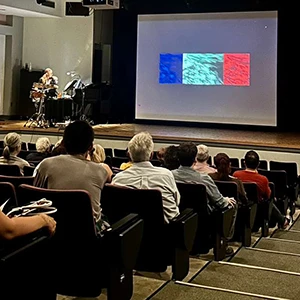
Silent Films Live Music
The rainy, melancholy afternoon of October 25 did not deter Tulane and New Orleans culture enthusiasts from attending two distinctive events presented by the Department of French and Italian in the Dixon Annex Recital Hall. The day’s program featured three world-renowned musicians specializing in live musical accompaniment for silent cinema.
Donald Sosin, pianist and composer, has worked in music and performance for over fifty years—as music director for numerous productions across the country and as a composer for television, theater, dance, and beyond. He has performed at some of the world’s most prestigious international film festivals, including many in the United States. Joanna Seaton, a singer and percussionist, has been described by The New York Times as a “silvery soprano.” An accomplished actress, lyricist, and teacher, she frequently collaborates with Sosin. Partners not only in music but also in life, the two also lead workshops on silent film music and songwriting for participants of all ages, welcoming both students and educators alike.
Alicia Svigals, violinist and composer, is a founding member of The Klezmatics, the only klezmer band to have won a Grammy Award. Widely regarded as the world’s leading klezmer fiddler, she has, among many achievements, revived the tradition of klezmer fiddling with her landmark 1996 solo album Fidl.
At 1:00 pm, a Workshop on Silent Film Music and Improvisation, directed by Sosin and Seaton and enthusiastically attended by students, faculty, and local musicians, used examples from classic films to demonstrate how silent cinema is scored. Participants were invited to improvise live accompaniment for several film clips, gaining a deeper appreciation of the relationship between image and sound in both silent and contemporary cinema.
At 5:30 pm, Silent Films Live Music presented a rich selection of short films and excerpts drawn from French, Italian, and Jewish-themed German and Austrian traditions of silent cinema. The lively audience was offered a rare opportunity—also a first of its kind at Tulane—to experience the magic of silent film accompanied by live, original music performed by world-class artists.
The opening French segment proved particularly striking, with highlights ranging from Méliès’s visual tricks and glimpses of elegant Parisian fashion from the 1920s to Dreyer’s Joan of Arc and Gance’s Napoléon. The Italian portion was no less enchanting, offering phantasmagoric Roman epics, modern industrial documentaries, and Pastrone’s spellbinding Filibus, among other works. Sosin and Svigals then brought the evening to a close in a soberly mesmerizing register with their recent original scores for films addressing Jewish historical themes from Germany and Austria.
The event was generously sponsored by the Department of French & Italian, the Newcomb Department of Music, the Katherine B. Gore Chair in French Studies, the Tulane University School of Liberal Arts Center for Scholars, the Maurice L. Silverstein Cinema Studies Lectureship Fund in the Department of Communication, the Italian Studies Fund, the Language Learning Center, the Department of Jewish Studies, the Department of Comparative Literature, and the Tulane Global Humanities Center.
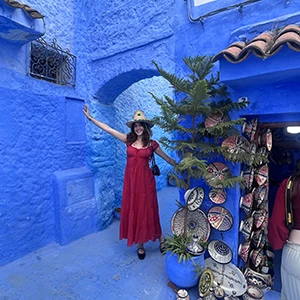
Study Abroad in Morocco
by Georgie Charette
As a double major in French and International Development, I chose to study in Rabat, the administrative capital of Morocco. This decision profoundly changed and challenged my worldview, vastly improved my French while introducing me to Arabic and clarified a motivating professional path that lies at the intersection of my academic interests as well as my personal goals.
With the goal of improving my French, I decided to take all my courses in French, which immediately immersed me in an academic environment that demanded adaptation. At Mohammed V University, I took a course on the history of Moroccan international relations with the hopes of exchanging ideas with local students and professors, while building relationships across cultural boundaries. This course also taught me to navigate different academic expectations and methodologies due to the self-driven nature of the classwork, pushing me to be more independent as a learner.
My North African politics course at the IES abroad center was particularly valuable, helping me understand the political climate of Morocco while living there and the history that shaped these realities. Studying these dynamics in French, from North African perspectives through local specialists rather than Western perspectives, significantly shifted my understanding of political development and international relations, while challenging my French language knowledge through complex scholarly articles and discussions.
I had the opportunity to intern with the Council for the Moroccan Community Abroad (CCME), which presented its own challenges and rewards. Using professional-level French with limited feedback tested my language abilities in ways that classroom learning never could. Furthermore, I gained valuable insight into development strategies and initiatives from a non-Western perspective, such as the way CCME uses the Moroccan diaspora as a development tool and showcasing what a participatory model of development looks like in practice.
Beyond French, I studied both Modern Standard Arabic and Darija, the Moroccan dialect. While incredibly challenging, learning even just a little bit of these languages opened windows to connect with the local populations in ways that French alone could not. Taking two hours of Arabic each morning challenged my brain while opening a pathway to professional opportunities through a place-based knowledge of a critical language. It also proved extremely valuable in communicating with my host family, who deepened my cultural immersion in unexpected ways. Communicating in French and Arabic at home allowed me to grow close relationships with my host mom and sister, who taught me to make traditional Moroccan dishes and were open to answering questions that I might not have found answers to otherwise. Living in a traditional home in the old Medina as I learned to respect their culture and traditions while staying true to myself forced me to grow interpersonally, and I can’t imagine my experience without them.
Studying in Morocco was truly the best decision I could have made. While it would have been easy to choose France, I discovered that meaningful learning happens when we step outside of our comfort zones, embrace complexity and foster cross-cultural dialogues that help challenge our assumptions about the world.

